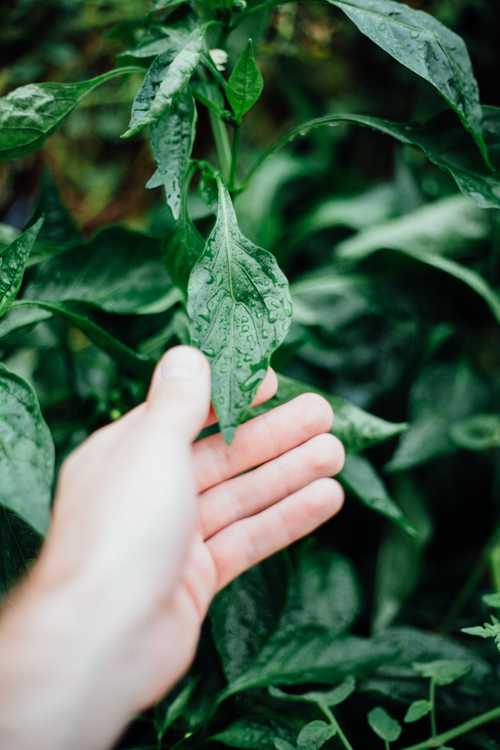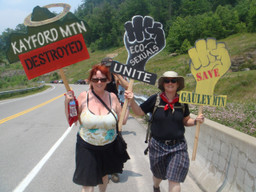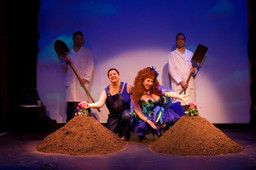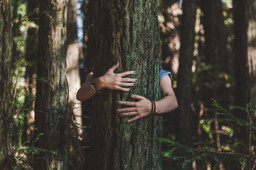
Cherish the Earth like a lover: An introduction to the ecosexuality movement
Sex. Don’t let those three letters put you off: the idea of ecosex is simply an exuberant framework for sharing and promoting love for the natural world, and of adjusting our relationship with it. Its conceit – to treat nature as a lover, rather than a mother – is not new; it’s no coincidence that the classic text by environmental activist and author Joanna Macy announces itself with similar language: World as Lover, World as Self.
Read on to gain a fuller understanding of this burgeoning eco movement.
What is ecosexuality?
The Here Come the Ecosexuals! website offers a range of definitions for the word “ecosexual”, including, “A person that finds nature romantic, sensual and sexy”, “[A] person who imagines the Earth as their lover”, “A term used in dating that describes a person interested in environmentalism”, and “An environmental activist strategy”.
In practice, it is all these and more.
Though “ecosexuality” appeared as a self-descriptor on online dating profiles at the beginning of the 2000s, the movement proper originated from the creative collaboration between “lovers, artists, and academics” Annie Sprinkle and Beth Stephens. In this current form, ecosex “aim[s] to entice people to develop a more mutual, pleasurable, sustainable, and less destructive relationship with the environment”. One major way in which it does so is by “shift[ing] the metaphor ‘Earth as Mother’ to ‘Earth as Lover’ to create a more reciprocal and empathetic relationship with the natural world”: Lover Earth, not Mother Earth.
As the UK Guardian summarized in an interview with Sprinkle: “You might give your mother a hard time and she’ll put up with it, but with a lover it’s a question of give and take and, ecosexuals believe, that’s just what the planet needs right now.” Reframing our connection with the Earth in this way, “Putting the responsibility on [ourselves] to uphold [our] side of the relationship […] [is] revolutionary.”
Similarly, Stephens sees the way in which the Earth is typically gendered as female as worthy of re-consideration: “In a misogynistic society, when people imagine the Earth as a ‘she’, they think she is less important than a he. So, the mostly all-male polluting corporate heads think they can treat the Earth badly.”
Interviewed for the On Being podcast, Joanna Macy reinforces the lack of reciprocity in our treatment of the Earth: “as if it were a supply house and a sewer. We’ve been grabbing, extracting resources from it for our cars and our hair dryers and our bombs, and we’ve been pouring the waste into it until it’s overflowing.”
By taking these unorthodox approaches to dominant (and frequently unanalyzed) tropes, ecosex asks questions like, “[Can] romantic love for nature mobilize others, before it’s too late, to fight for social and environmental justice”? “[Should] one ask a tree for permission before giving it a hug?” And how can the exhaustion experienced by activists battling the psychopathy of corporations itself be fought?
In its non-extractive, “pleasure-centric framework for climate justice”, this witty movement has expanded into a sexuality, an environmental activism strategy, and a flourishing discipline within the world of academia.

It should also be noted, that though ecosex is grounded in notions of queer identity and expression, there is no barrier to identifying with the movement’s love for the Earth even if you are straight!
How did ecosexuality come about?
This “distinctly queer strand of climate activism” arose from a series of 21 ‘Green Wedding’ performances. During these ceremonies – which took place across nine years, in nine different countries – Sprinkle, Stephens, and their audiences wed a range of natural entities (such as the sky, the moon, the snow, and the Appalachian Mountains). Subsequently, the duo chose to further define and expand the resulting idea of ecosex.
The result, “Compared to overly earnest, New Agey environmental movements, ‘[was] more of a punk rock, queer, drag pin-up-girl version of environmental activism’.” Instead, “The movement has always been rooted in pleasure” – an approach drawing on Sprinkle’s background, which, since the 1980s, has combined roles as a sex worker, artist, and activist, taking in AIDS education, radical performance art, and sex positivity.

While nature has been venerated in various ways throughout history, ecosexuality’s explicit alignment with queerness may seem distinctively contemporary. In fact, it is simply the most modern flowering of this collision between the natural world and alternative sexualities and gender expressions. Antecedents include the Radical Faeries – “gay men who gathered in the wilderness [around Los Angeles in the 1970s] to explore a new spirituality rooted in nature and queerness” – and “lesbian separatists [who] fantasized about gardening naked in the sun in women-only communes”. These movements themselves built upon the nature-worship of the New England Transcendentalists, whose most famous proponent remains the (assumed queer) US poet Walt Whitman. “Now I see the secret of making the best person”, he wrote: “it is to grow in the open air and to eat and sleep with the earth.”
Whitman’s younger English contemporary, the (unequivocally queer) utopian socialist poet-philosopher Edward Carpenter – “gay godfather of the British left” – embodied many traits which would still chime with the mores of ecosex and the left today: from prison reform, sexual liberation, gay rights (at the time of the Oscar Wilde trials, when the death penalty for acts of sodomy had been abolished less than 35 years earlier), animal rights, and opposition to pollution, capitalism, and the landed gentry; to vegetarianism, nudism, ‘the simple life’, craft-making, market gardening – and the adoption of Indian-style sandals, which he popularized in England.
Why is ecosexuality significant?
Jenny Schlenzka, the incoming director of Berlin’s Martin-Gropius-Bau gallery, is attracted to the way that Sprinkle and Stephens convert “the political and serious into fun and humor” – a not inconsiderable achievement, given the “dystopian and depressive” nature of environmental crises and the discourse around them.
In contrast to “paralyzing” negativity, which mistakes earnestness for credibility, she is “convinced that fighting environmental pollution from a place of joy and desire will ultimately be more successful and enduring than telling people the world is about to end”.
The movement’s playfulness, which it is hoped will give “the average person a way of engaging with the issue [of environmentalism] that is accessible and fun, and […] creates a sense of hopefulness”, is also key to its queerness. The sense of humor at the heart of ecosex is what queers it, in contrast to other mainstream environmental movements, by “saying ‘we don’t need that respectability’”. This is not only drawing queer people into climate activism (see: Pride marchers “covered in glitter (biodegradable, of course) […] with placards reading COMPOSTING IS SO HOT and THE EARTH IS OUR LOVER”), but engaging communities historically marginalized by climate injustice and the associated, broader injustices of racism, colonialism, and homophobia.
“Colonized countries remain the most heavily-impacted by the climate crisis, and they’re disproportionately starved of resources while bearing the environmental brunt of hypercapitalist consumption. LGBTQ+ people are more likely to be excluded from disaster relief efforts and to live in areas with higher rates of air pollution.” Sprinkle and Stephens “humbly propose ecosex as one of many pathways to healing the pain of both the present moment and the horrific injustices of the past”.
At root, the way it is hoped that ecosex can do this is endearingly simple; as Sprinkle states, she “just want[s] people to love the Earth more”.
What ecosexual resources are available?
- Sprinkle and Stephens’ Assuming the Ecosexual Position: The Earth as Lover (2021) lays out a “call to transformative art and life”
- The first International Ecosex Symposium took place in Madrid, Spain, in 2013; the most recent – Exploring the Earth as Lover: Ecosex and the City – took place in New York in June 2023 and invited participants to “mingle with diverse life forms and various communities of artists, scholars, sex workers, queers, fashionistas, plants, spores, water drops, clouds, and more, more, more”
- In lecture presentation Assuming the Ecosexual Position, Sprinkle and Stephens “share [their] adventures in romance, breast cancer, radical sex education, artificial insemination and environmental activism”
- Theater productions Earthy: An Ecosex Bootcamp and Dirty Sexecology: 25 Ways to Make Love to the Earth aimed “to make eco-activism more sexy, fun and diverse” and allow Sprinkle and Stephens to “come out of the closet as eco-sexuals”, respectively
- The duo even lead ‘sexecological’ walking tours, where participants “are urged to caress branches, to sensually sniff plants, and to literally hug trees”.
Sprinkle and Stephens have also made various ecosexual films:
- The upcoming Playing with Fire will address the ways in which the social fabric of the US and the natural world are inextricably linked, using wildfires’ ecologically destructive effects to illustrate “the federal government’s failures to effectively provide care and support […] and to regulate the fossil fuel industry”
- Water Makes Us Wet: An Ecosexual Adventure (2019) “chronicles the pleasures and politics of H₂O […], climaxing in a shocking event that reaffirms the power of water, life and love”
- Goodbye Gauley Mountain: An Ecosexual Love Story (2013) follows Sprinkle and Stephens as they “raise performance art hell” to protest “mountain top removal (MTR) mining practices, which are destroying the forests, towns, and people they love [in the biodiverse Appalachian Mountains]”.
In addition, without being aware of Sprinkle and Stephens’ use of the term ‘ecosex’, in 2010 sexologist Stefanie Iris Weiss published Eco-Sex: Go Green between the Sheets and Make Your Love Life Sustainable – “a green sex guide” which “reveal[s] the harmful environmental impact of materials used in condoms, lubes, and other sex products upon both our bodies and the planet”, and offers healthy, green, low-impact, and fair-trade alternatives.
Are you ecosexual?
Writing for Wonderground, author and founding editor Georgina Reid outed herself as a “long term ecosexual”; someone who “stroke[s] trees as [she] walk[s] by them in the bush” and “sometimes […] wrap[s] [her] arms around them […] [and] get[s] down on [her] hands and knees to marvel at tiny flowers hidden amongst leaf litter and […] get[s] excited by the sweet smelling mix of cow shit, lucerne hay and soil”.

She writes that her intention was always that Wonderground “would seduce people into falling in love with the world, through falling in love with plants”: ecosexuality in action!
If you are experiencing any stirrings which lead you to suspect that your own relationship to the natural world may not be entirely filial, Stephens and Sprinkle have prepared an ecosex manifesto which may help you to come to terms with the flowering of your nascent ecosexual identity.
So, go on: “take [the Earth] out. Go on a picnic. […] Clean up your local beach. As you do, flirt with the Earth […]. It can be a slow date […]. Let it last days, weeks, years, or even a lifetime.” 🍀
Featured photo by Ryan Jacobson on Unsplash
Earth.fm is a completely free streaming service of 1000+ nature sounds from around the world, offering natural soundscapes and guided meditations for people who wish to listen to nature, relax, and become more connected. Launched in 2022, Earth.fm is a non-profit and a 1% for the Planet Environmental Partner.
Check out our recordings of nature ambience from sound recordists and artists spanning the globe, our thematic playlists of immersive soundscapes and our Wind Is the Original Radio podcast.
You can join the Earth.fm family by signing up for our newsletter of weekly inspiration for your precious ears, or become a member to enjoy the extra Earth.fm features and goodies and support us on our mission.
Subscription fees contribute to growing our library of authentic nature sounds, research into topics like noise pollution and the connection between nature and mental wellbeing, as well as funding grants that support emerging nature sound recordists from underprivileged communities.

